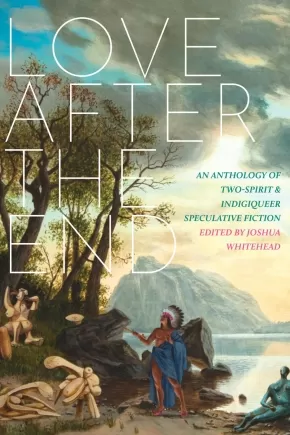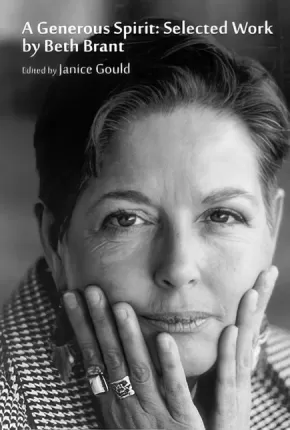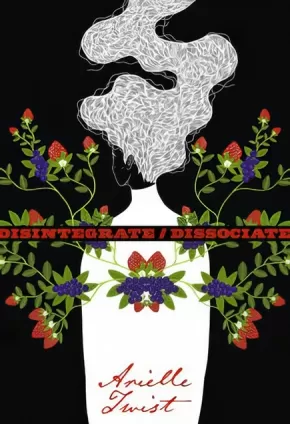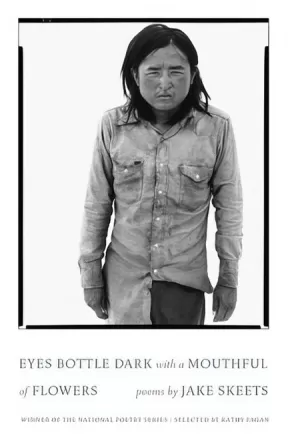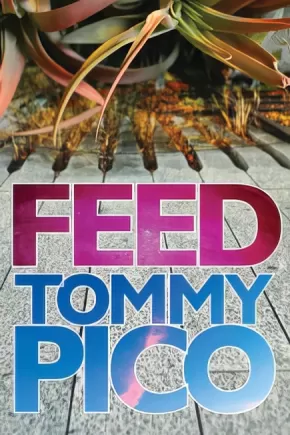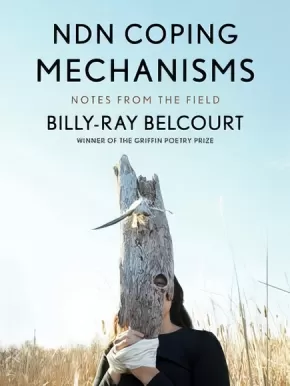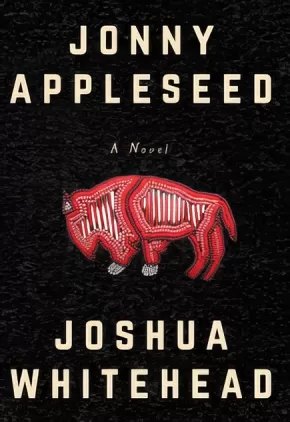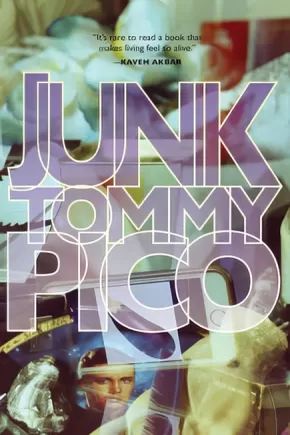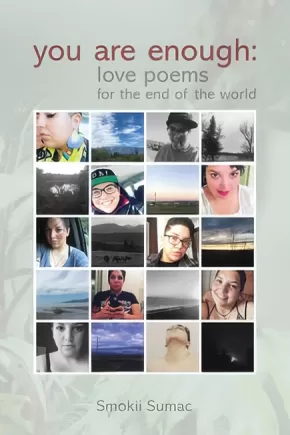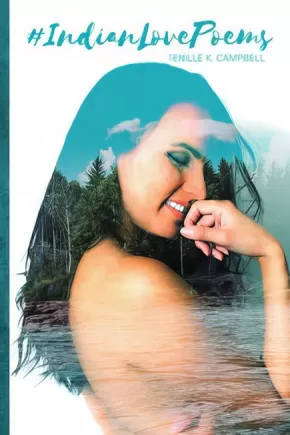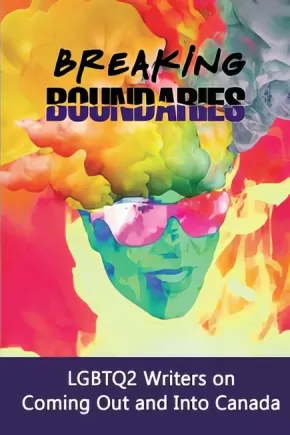LGBTQ2S+
Synopsis:
A bold and breathtaking anthology of queer Indigenous speculative fiction, edited by the author of Jonny Appleseed.
This exciting and groundbreaking fiction collection showcases a number of new and emerging 2SQ (Two-Spirit and queer) Indigenous writers from across Turtle Island. These visionary authors show how queer Indigenous communities can bloom and thrive through utopian narratives that detail the vivacity and strength of 2SQness throughout its plight in the maw of settler colonialism's histories.
Here, readers will discover bioengineered AI rats, transplanted trees in space, the rise of a 2SQ resistance camp, a primer on how to survive Indigiqueerly, virtual reality applications, mother ships at sea, and the very bending of space-time continuums queered through NDN time. Love after the End demonstrates the imaginatively queer Two-Spirit futurisms we have all been dreaming of since 1492.
Contributors include Nathan Adler, Darcie Little Badger, Gabriel Castilloux Calderon, Adam Garnet Jones, Mari Kurisato, Kai Minosh Pyle, David Alexander Robertson, jaye simpson, and Nazbah Tom.
Reviews
"Many of the stories offer portraits of a dead Earth from which new life springs, and all are ultimately uplifting, hinting at a way forward through the darkness of the present. Drawing on deep wells of history and experience, these powerful stories are sure to impress." —Publishers Weekly
"The so-called end times feel so perilously close right now. With such a cacophony of anxiety, despair, and cynicism bearing down on us, it is sometimes easy to forget that Indigenous peoples have been here before, and we still remain to uphold our responsibilities to the world and to one another. Our stories guide us forward into an ever-uncertain future, just as they guide us back home. And as editor Joshua Whitehead affirms in the introduction, Love after the End is a book we need right now - and well beyond the now. The stories here are difficult, they're beautiful, they're hilarious and sad and frightening and hopeful. But more than all of that, they guide us back to ourselves and to our relations on a shimmering trail of song and stardust. The two-spirit visionaries in this collection remind us in so many ways that the world is a wounded relative in need of healing, and that to abandon her in this time of trial is to betray the sacred bonds of kinship that we were meant to carry with courage and compassion. I am grateful beyond words that this book is in the world, and grateful to the writers, artists, and editor for the gift of (re)imagining futures where Indigenous love, liberation, and laughter flourish far beyond the settler imaginary. —Daniel Heath Justice, author of Why Indigenous Literatures Matter
"Each of these smart, stunning, imaginative stories has not only fuelled my imagination but also filled my heart, reminding me how dramatically different it is to experience work written with absolute love. Reading Love after the End is like being handed a glass of fresh water in the middle of the desert." —Alicia Elliott, author of A Mind Spread Out on the Ground
Additional Information
192 pages | 5.80" x 9.00"
Synopsis:
A Generous Spirit: Selected Work by Beth Brant collects the writing of Beth Brant, Mohawk lesbian poet, essayist, and activist. During her life, Brant's work gave voice to an often unacknowledged Two-Spirit identity, and today, her words represent continued strength, growth, and connection in the face of deep suffering. A Generous Spirit is Brant's portrait of survival and empathy at the intersection of Native American and lesbian experience.
Edited by noted Native poet and scholar Janice Gould, A Generous Spirit recounts and enacts the continuance of her people and her sisters with distinct, organic voices and Brant's characteristic warmth. Her work is a simultaneous cry of grief and celebration of human compassion and connection in its shared experience. Through storytelling, her characters wrest their own voices from years of silence and find communion with other souls.
Additional Information
200 pages | 5.37" x 8.50"
Synopsis:
In her powerful debut collection of poetry, Arielle Twist unravels the complexities of human relationships after death and metamorphosis. In these spare yet powerful poems, she explores, with both rage and tenderness, the parameters of grief, trauma, displacement, and identity. Weaving together a past made murky by uncertainty and a present which exists in multitudes, Arielle Twist poetically navigates through what it means to be an Indigenous trans woman, discovering the possibilities of a hopeful future and a transcendent, beautiful path to regaining softness.
Awards
- 2020 Indigenous Voices Awards Winner for Published Poetry in English
Additional Information
|
Synopsis:
Selected by Kathy Fagan as a winner of the 2018 National Poetry Series, Eyes Bottle Dark with a Mouthful of Flowers is a debut collection of poems by a dazzling geologist of queer eros.
Drunktown, New Mexico, is a place where men “only touch when they fuck in a backseat.” Its landscape is scarred by violence: done to it, done on it, done for it. Under the cover of deepest night, sleeping men are run over by trucks. Navajo bodies are deserted in fields. Resources are extracted. Lines are crossed. Men communicate through beatings, and football, and sex. In this place, “the closest men become is when they are covered in blood / or nothing at all.”
But if Jake Skeets’s collection is an unflinching portrait of the actual west, it is also a fierce reclamation of a living place—full of beauty as well as brutality, whose shadows are equally capable of protecting encounters between boys learning to become, and to love, men. Its landscapes are ravaged, but they are also startlingly lush with cacti, yarrow, larkspur, sagebrush. And even their scars are made newly tender when mapped onto the lover’s body: A spine becomes a railroad.“Veins burst oil, elk black.” And “becoming a man / means knowing how to become charcoal.” Rooted in Navajo history and thought, these poems show what has been brewing in an often forgotten part of the American literary landscape, an important language, beautiful and bone dense.
Sculptural, ambitious, and defiantly vulnerable, the poems of Eyes Bottle Dark with a Mouthful of Flowers are coal that remains coal, despite the forces that conspire for diamond, for electricity.
Reviews
“Jake Skeets writes with such sparse yet full beauty, you sometimes don’t know where the source of the power of these poems comes from. It is in the power of his language, in the craft, of course. It is in how the brutal experience of pain and loss can become a thing of beauty, which is where grace lives, which is where the best art comes from. There is so much bottle-dark beauty here. Skeets is a new, essential voice in poetry, in literature.”—Tommy Orange
"Incredibly beautiful . . . Skeets's simple lines are highly impactful as they explore the complexities of love, desire and drunkenness and dirt and death."—Electric Literature
"Skeets's raw debut offers beautiful imagery and memorable emotional honesty . . . [this collection] subtly rebukes the hypermasculinity that breeds homophobia and violence and excoriates the centuries of oppression that have caused the scourge of alcohol abuse in Native American communities."—Publishers Weekly
“On its surface, Eyes Bottle Dark with a Mouthful of Flowers is an examination of toxic masculinity through the lens of a queer, indigenous Southwesterner, a book in which alcoholism, violence, and sex under cover of night are both ruefully and sensually described. But experiencing Jake Skeets’s collection is more akin to listening to a musical score to, or watching the choreography of, one Diné man’s vivid boyhood, the family and community of that boyhood, and the landscape holding them all. Indeed, like a lover, the land of these poems enters and ornaments Skeets’s men, old and young, dead and alive. His images haunt, and his use of repetition, field, and fragment provide the book’s structural genius. His is a major debut that feels to me timely and timeless—‘boys only hold boys / like bottles’—and is my singular joy to introduce.”—Kathy Fagan
“Jake Skeets takes us to ‘The Indian Capital of the World,’ a landscape of erosion and erasure, where ‘boys only hold boys / like bottles’ and eros is a dangerous thing. In the brush and horseweed, ghosts and trains and abandoned trailers, a young Diné attempts to answer all the question marks of adolescence and early adulthood, desire and death commingling around him. These are poems born of unspokenness, testing the limits of language, love, and silence.”—D. A. Powell
"An amazing debut collection from Diné poet Jake Skeets that explores his experience and that of Native peoples with the American Southwest. Skeets's ability to use form and innovate with structure amplify his innate talent for constructing language that is simultaneously lush and razor sharp. Grappling with alcoholism, queer sexuality, and toxic masculinity, his poems confront and challenge; but through its swirl of violence and beauty, Eyes Bottle Dark with a Mouthful of Flowers is always vividly gorgeous."—Caleb Masters, Bookmarks
Additional Information
96 pages | 5.50" x 8.50"
Synopsis:
From the Winner of the Whiting Award, an American Book Award, and finalist for a Lambda, Tommy Pico's Feed is the final book in the Teebs Cycle.
Feed is the fourth book in the Teebs tetralogy. It's an epistolary recipe for the main character, a poem of nourishment, and a jaunty walk through New York's High Line park, with the lines, stanzas, paragraphs, dialogue, and registers approximating the park's cultivated gardens of wildness. Among its questions, Feed asks what's the difference between being alone and being lonely? Can you ever really be friends with an ex? How do you make perfect mac & cheese? Feed is an ode of reconciliation to the wild inconsistencies of a northeast spring, a frustrating season of back-and-forth, of thaw and blizzard, but with a faith that even amidst the mess, it knows where it's going.
Reviews
"Funny, irreverent, profound. This book is an ode to love and language and food and what right now sounds like. It’s also a meditation on what it means to belong on/to this planet/universe. Delivered in headlines, texts, conversations, song lyrics, puns, rhymes, and speculation about the possibility of life on other planets, Tommy Pico’s Feed sprawls across time and this country. It is endlessly inventive and stays fun while bringing the heat and weight of a world we’re all helplessly watching burn down. As his character/AKA Teebs says of Oakland rapper Two $hort, the same is true of Tommy Pico in this book and in general: Vigor is the art he argues for."—Tommy Orange
"Tommy Pico’s Feed is the poet’s most ambitious work yet. Part tour diary, part tracklist, part play, part by part Pico tops his epic run of books off with this gut-wrenching, gut-busting, gutter mouth offering of a body in lust, in isolation, in danger, in memory, in future and all the transits between. Feed is a feast of Pico’s signature intellect, humor, and linguistic demolition—all sharper than ever. No one corrals our day’s chaos like Pico, who serves it up to us as some of the wildest verse the world has ever seen." —Danez Smith
Additional Information
84 pages | 6.00" x 9.00"
Synopsis:
In the follow-up to his Griffin Poetry Prize-winning collection, This Wound is a World, Billy-Ray Belcourt aims more of an anthropological eye at the contours of NDN and queer social worlds to spot much that is left unsaid when we look only to the mainstream media. In this genre-bending work, Belcourt employs poetry, poetics, prose, and textual art to illuminate the rogue possibilities bubbling up everywhere NDNs are.
Part One examines the rhythms of everyday life, which include the terrible beauty of the reserve, the afterlives of history, and the grammar of anal sex. Part Two experiments with form and practice, putting to use, for example, a mode of documentary poetics that unearths the logics that make and unmake texts like Treaty 8.
NDN Coping Mechanisms: Notes from the Field emerges out of a form of auto/ethnographic sensibility that is at turns campy and playful, jarring and candid, displaying, once again, the writer’s extraordinary craft, guile, audacity, and the sheer dexterity of his imagination.
Awards
- 2019 Stephan G. Stephansson Award for Poetry Winner
Reviews
"This brilliant book is endlessly giving, lingering in tight spaces within the forms of loneliness, showing us their contours. These poems do the necessary work of negotiating with the heart-killing present from which we imagine and make Indigenous futures. Every line feels like a possible way out of despair.” — Elissa Washuta, author of My Body Is a Book of Rules
“‘I believe I exist. / To live, one can be neither / more nor less hungry than that.’ How grateful I am that Billy-Ray Belcourt and these poems believe in themselves enough to exist. With prodigious clarity, this work moves swiftly amongst theory and prose, longing and lyric, questioning and coping, ‘not dying’ and ‘obsessively apologizing to the moon for all that she has to witness.’ It is not hyperbole to say these poems are brilliant. And so brilliantly, searingly, they live.” — TC Tolbert, author of Gephyromania
“NDN Coping Mechanisms is a haunting book that dreams a new world — a ‘holy place filled with NDN girls, hair wet with utopia’ — as it simultaneously excoriates the world that ‘is a wound’ and the historic and present modalities of violence against Indigenous peoples under Canadian settler colonialism. Belcourt considers the genocidal nation-state, queerness, and the limits and potential of representation, often through a poetic/scholarly lineage that includes Leanne Betasamosake Simpson, Saidiya Hartman, Anne Boyer, José Esteban Muñoz, Christina Sharpe, and Gwen Benaway, among others. This is the beautiful achievement of NDN Coping Mechanisms: Belcourt conjures a sovereign literary space that refuses white sovereignty and is always already in relation to the ideas of the foremost decolonial poets and thinkers of Turtle Island.” — Mercedes Eng, author of Prison Industrial Complex Explodes
Additional Information
112 pages | 6.00" x 8.00"
Synopsis:
A tour-de-force debut novel about a Two-Spirit Indigiqueer young man and proud NDN glitter princess who must reckon with his past when he returns home to his reserve.
"You're gonna need a rock and a whole lotta medicine" is a mantra that Jonny Appleseed, a young Two-Spirit/Indigiqueer, repeats to himself in this vivid and utterly compelling debut novel by poet Joshua Whitehead.
Off the reserve and trying to find ways to live and love in the big city, Jonny becomes a cybersex worker who fetishizes himself in order to make a living. Self-ordained as an NDN glitter princess, Jonny has one week before he must return to the "rez"--and his former life--to attend the funeral of his stepfather. The seven days that follow are like a fevered dream: stories of love, trauma, sex, kinship, ambition, and the heartbreaking recollection of his beloved kokum (grandmother). Jonny's life is a series of breakages, appendages, and linkages--and as he goes through the motions of preparing to return home, he learns how to put together the pieces of his life.
Jonny Appleseed is a unique, shattering vision of First Nations life, full of grit, glitter, and dreams.
Awards
- 2021 Canada Reads winner
Reviews
"If we're lucky, we'll find one or two books in a lifetime that change the language of story, that manage to illuminate new curves in the flat vessels of old letters and words. This is one of those books. Jonny Appleseed gifts us with clarity in the shape of sharp, and medicine in the guise of soft -- and a sexy, powerful, broken, beautiful hero who has enough capacity in the dent of a clavicle to hold all the tears of his family. This book gives us back the land of curb and field, trailer and ledge, and the community -- in all its rusted and complicated glory. Most importantly, this book gifts us with the opportunity to hear the innovative and the ancient in the prose of a new literary goddess, Joshua Whitehead." ―Cherie Dimaline, author of The Marrow Thieves
"Joshua Whitehead redefines what queer Indigenous writing can be in his powerful debut novel. Jonny Appleseed transcends genres of writing to blend the sacred and the sexual into a vital expression of Indigenous desire and love. Reading it is a coming home to bodies, stories, and experiences of queer Indigenous life that has never been so richly and honestly shown before. This book is an honour song to every queer NDN body who has ever lived and it will transform the universe with its beauty and magic." ―Gwen Benaway, author of Passage
Educator Information
Caution: graphic/mature content such as sexual descriptions.
Additional Information
224 pages | 5.50" x 8.00"
Synopsis:
From 2018 Whiting Award winner Tommy Pico, Junk is a book-length break-up poem that explores the experience of loss and erasure, both personal and cultural.
The third book in Tommy Pico’s Teebs series, Junk is a breakup poem in couplets: ice floe and hot lava, a tribute to Janet Jackson and nacho cheese. In the static that follows the loss of a job or an apartment or a boyfriend, what can you grab onto for orientation? The narrator wonders what happens to the sense of self when the illusion of security has been stripped away. And for an indigenous person, how do these lost markers of identity echo larger cultural losses and erasures in a changing political landscape? In part taking its cue from A.R. Ammons’s Garbage, Teebs names this liminal space “Junk,” in the sense that a junk shop is full of old things waiting for their next use; different items that collectively become indistinct. But can there be a comfort outside the anxiety of utility? An appreciation of “being” for the sake of being? And will there be Chili Cheese Fritos?
Awards
- NPR Book of the Year Award
- Winner of the 2018 Whiting Award
Reviews
"Tommy Pico's books are contemporary epics. He writes poetry of rare brilliance, assured in form and forceful in its interrogation of myth and cultural expectations and self."—Whiting Award Committee
"Tommy Pico's new collection, Junk, is nimble as jazz, intentionally unstable, a queer Beat novel in verse for the social media age." —Gregory Cowles, The New York Times Book Review
"Junk is a true American odyssey, complete with a reluctant hero who defies all odds to survive. Repulsed by the trashiness of empire, the violence of occupation, this book nonetheless searches in earnest for real tenderness, a romance that isn’t corny. . . . This is poetry of the highest order, on the level of a pop song, with the crystalline visions of a seer. I consumed it greedily, repeatedly, and am forever changed because of it." —Jenny Zhang, author of SOUR HEART
"Tommy Pico’s complex and lush third collection, Junk, explodes, rewinds, meditates, and explodes again. It binges and purges—on class, identity, sex, politics, snacks, comfort, and fear. . . . Pico is a master of inclusion, of elevating the mundane to the sublime, of examining absurdity and grave seriousness with equal measure. This is an ambitious long poem, and Pico is uniquely qualified to both drag and celebrate modern day consumption and indulgence with graceful humor and grit."—Morgan Parker, author of THERE ARE MORE BEAUTIFUL THINGS THAN BEYONCE
"Whiting Award-winner Tommy Pico follows his cult favorites Nature Poem and IRL with a gloriously wide-ranging monologue on love and friendship, queer and indigenous identity, Janet Jackson and nacho cheese. Pico builds his own 21st-century poetics, junk and all—and as he writes, 'It's important / to value the Junk, Junk has the best stories.'" —NPR
"Build[s] into an apocalyptic crescendo via Pico’s propulsive fervor . . . Pico demonstrates that a person’s many selves, traumas, anxieties, hookups, and breakups can become a marker of courage and survival."—Publishers Weekly, Starred Review
Additional Information
80 pages | 6.00" x 9.00"
Synopsis:
In his debut poetry collection you are enough: love poems for the end of the world, Smokii Sumac has curated a selection of works from two years of a near daily poetry practice. What began as a sort of daily online poetry journal using the hashtag #haikuaday, has since transformed into a brilliant collection of storytelling drawing upon Indigenous literary practice, and inspired by works like Billy Ray Belcourt's This Wound is a World, and Tenille Campbell's #IndianLovePoems.
The poems follow the haiku format, often stringing together three lines to tell a story. With sections dealing with recovery from addiction and depression, coming home through ceremony, and of course, as the title suggests, on falling in and out of love, Sumac brings the reader through two years of life as a Ktunaxa Two-Spirit person. This collection will move you as Sumac addresses the grief of being an Indigenous person in Canada, shares timely (and sometimes hilarious) musings on consent, sex, and gender, introduces readers to people and places he has loved and learned from, and through it all, helps us all come to know that we are enough, just as we are.
Awards
- 2019 Indigenous Voices Awards Winner for Published Poetry in English
Additional Information
108 pages | 5.50" x 8.50"
Synopsis:
Covering Indigenous adventures from Wahpole Island to Northern Saskatchewan to the coast of Vancouver, #IndianLovePoems is a poetry collection that delves into the humour and truths of love and lust within Indigenous communities. Sharing stories in search of The One, or even better, that One-Night-Stand, or the opening of boundaries -- can we say medicine wheel -- this collection fearlessly sheds light on the sharing and honesty that comes with discussions of men, women, sex, and relationships, using humour to chat about the complexities of race, culture and intent within relationships. From discovering your own John Smith to sharing sushi in bed, #IndianLovePoems will make you smile, shake your head, and remember your own stories about that special someone.
Reviews
"These are resolutely modern poems written for the great variety of women and LGBTQ2S people of today. They turn the stereotypes of the “Vanishing Indian” and “unchanging cultures” upside down with mentions of campus life, sexting, Tinder, and of course Twitter (the poems have non-serialized numbers with hashtags). There is power in Campbell’s creative use of imagery and everyday language. #IndianLovePoems is a must-read from a very exciting new voice who will undoubtedly become an established name." - Sylvie Vranckx, Canadian Literature: A Quarterly of Criticism and Review
Additional Information
96 pages | 6.00" x 9.00"
Synopsis:
An anthology of stories and poetry written by Canadian LGBTQ2 authors who are immigrants, refugees, or Canada-born.
“What does it mean to be LGBTQ2 in Canada? The only possible answer to that question is one given in many voices. That is exactly what this book offers. There is struggle in these stories and poems, but there is also strength and resilience, compassion and determination. Woven together these voices leave me with a sense of hopefulness: a belief that the creativity and fierce commitment of our community will carry us forward as we work to create a Canada that lives up to the dream of freedom and safety it represents to so many people around the world.” — Robin Stevenson, author of Pride: Celebrating Diversity and Community
Review
The anthology pieces are diverse with authors who identify as Lesbian, Gay, Bisexual, Transgender and 2-Spirited. It also includes stunning artwork by LGBTQ artists and allies. — Rainbow Refugee Society
Authors & Artists
Authors in this anthology include Teryl Berg, Kyle Chen, Wendy Judith Cutler, Corrie Hope Furst, Kevin Henry, Anne Hofland, Chantal Hughes, Masaki Kidokoro, Dale Lee Kwong, Austin Lee, JL Lori, Eka Nasution (narrator), Adam Nixon, Rainer Oktovianus (narrator), Gail Marlene Schwartz, Caelan Sinclair, LS Stone, Sosania Tomlinson, E.T. Turner, and Hayley Zacks.
Artwork by Joni Danielson, Wokie Clark Fraser, Austin Lee, Trinity Lindenau, and Rainer Oktovianus.
Additional Information
146 pages | 6.00" x 9.00"
Edited by Lori Shwydky
This book contains memoirs, stories, poems, and artwork, which is why it appears in a variety of categories, such as both Fiction and Non-fiction, on our website.

